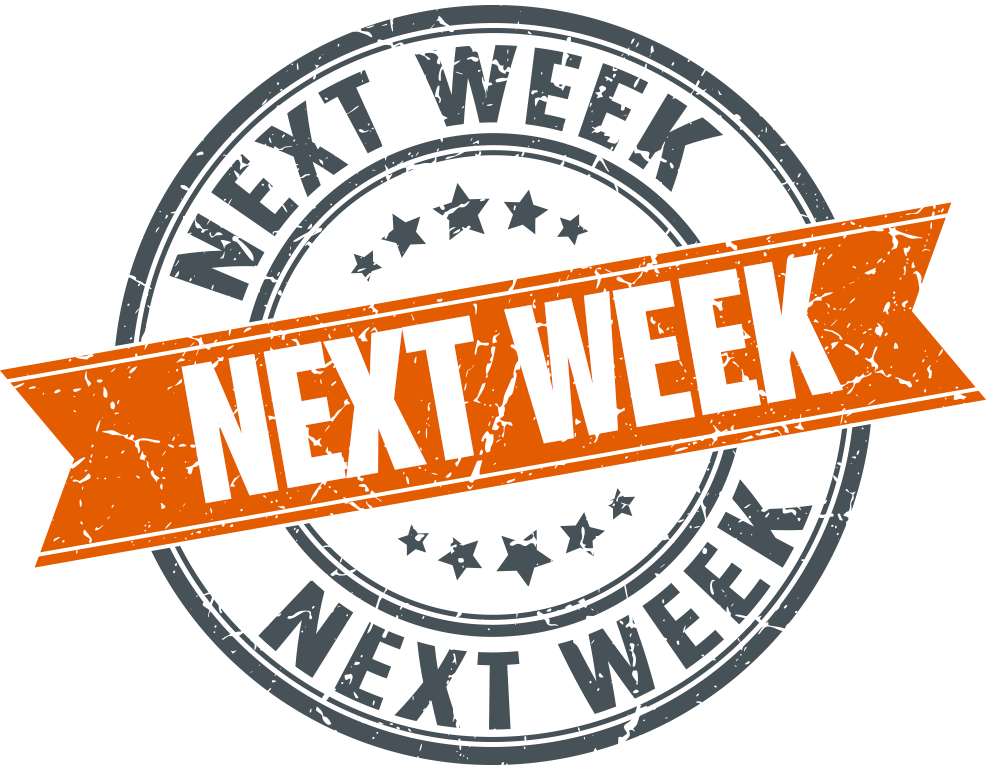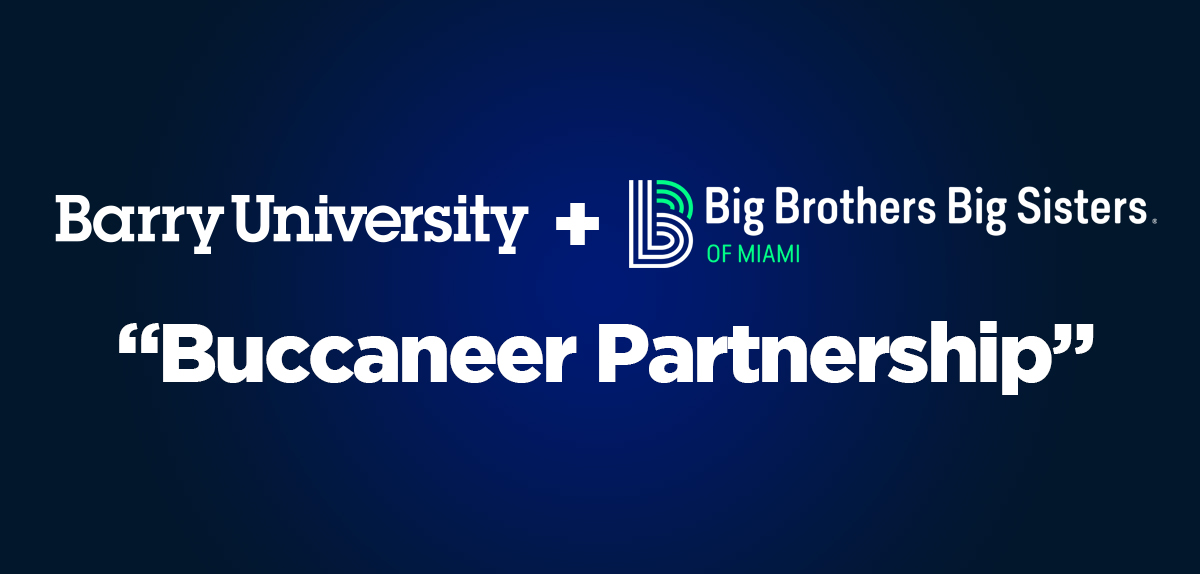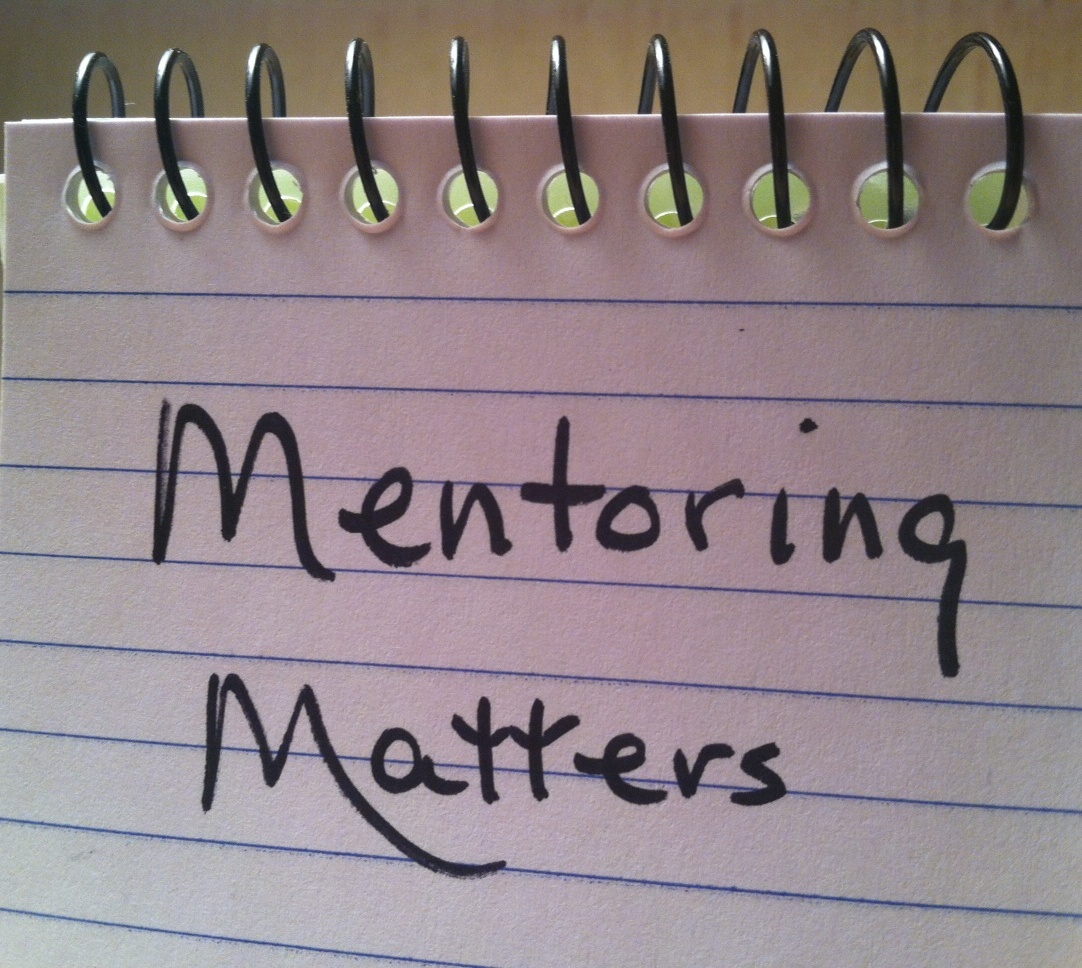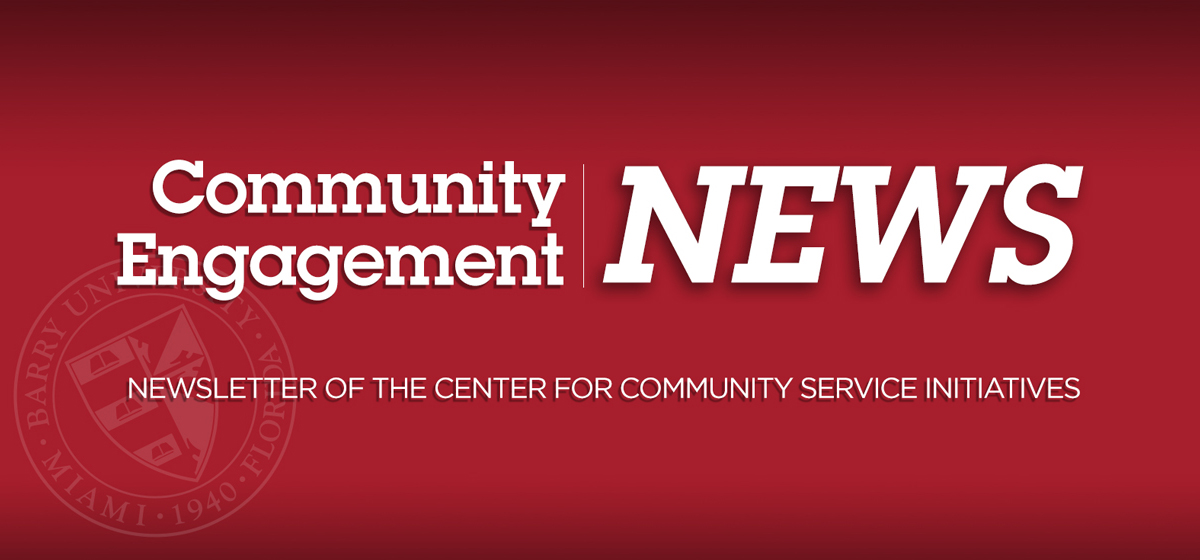April 26, 2021
IN THIS ISSUE
- Environmental Issues Capture Attention During Barry’s Earth Week
- Barry Volunteers and High School Students Participate in Sustainability Saturday Project at Virginia Key
- Bread for the World Receives Barry University’s Community Partnership Award
- Community Engagement at Barry Over the Years: A Pictorial Report
Environmental Issues Capture Attention During Barry’s Earth Week
Climate Justice And Racial Justice Are “Inextricably Linked”




Contributing to the dialogue during the forum were (from left) Gisela Regalado, an environmental science student; Dr. Anita Závodská, associate professor of environmental sciences; Javier Bracho Muñóz, a fellow in the Barry Service Corps; and Joanne Pérodin, the climate justice program director at Florida Rising.
By Glenn Bowen
Environmental matters have been on many minds this month—here at Barry, throughout the United States, and across the world. For Barry, it was another opportunity to advance the institutional commitment to promoting recognition of “the sacredness of Earth.”
As part of Barry’s Earth Week, a forum in the Deliberative Dialogue Series drew attention specifically to climate change. And a day of service engaged volunteers in doing their part to preserve the local ecosystem (see separate story below).
Part of the 2020–2021 “Race Matters” series, the forum on April 15—one week before Earth Day, a global celebration—was designed to highlight the disproportionate effects of climate change on communities of color.
Climate justice and racial justice are “inextricably linked,” forum participants agreed. Furthermore, they noted, people who are disadvantaged, such as people of color, are at greater risk of experiencing its negative effects.
“It is always the poorest people who get impacted the hardest, even though they are the ones who [make] the least contributions to [climate change],” argued Dr. Anita Závodská, associate professor of environmental sciences.”
Závodská said industrialized countries should set an example for developing countries by adopting a clean energy policy, using renewable energy resources, and reducing carbon emissions.
“What we been doing is not sustainable, and it can’t not go on like this,” she said, adding that it will take “political will” for the necessary change to occur.
Among the lead participants in the 90-minute forum were Joanne Pérodin, the climate justice program director at Florida Rising, and Gisela Regalado, a Barry biology student. Barry Service Corps Fellow Javier Bracho Muñóz contributed to the dialogue.
Dr. Tisa McGhee, an associate professor of social work, and Courtney Berrien, associate director of the Center for Community Service Initiatives (CCSI), were the forum facilitators. Berrien is coordinator of the Deliberative Dialogue Series.



The forum facilitators were Dr. Tisa McGhee, an associate professor of social work, and Courtney Berrien, associate director of the CCSI.
Florida Rising—a January 2021 merger of The New Florida Majority and Organize Florida—is an independent political organization seeking to advance social, economic, and racial justice across the state, particularly for historically marginalized communities. Calling for climate justice, Florida Rising wants “a regenerative future and a just transition that puts frontline communities at the center of energy policy, disaster response, food policy, and all climate change initiatives.”
Pérodin talked about climate justice and racial justice as “interconnected issues.” She advocated “a bottom-up approach” to addressing the issues, which would allow the voice of the people to be heard by decision makers.
“I think it’s going to take a while before true change, true solutions, and processes are put in place to address the climate crisis,” Pérodin said. “And I think that’s why it’s important for those who are being impacted the hardest by the climate crisis to become educated … about what’s really happening, and also understand the interconnections between climate and what they have to face every day.”
McGhee opined that communities do not have access to the “right information” regarding climate change and its effects on people’s health. She suggested that such information could lead to better health outcomes.
Bracho, the student leader, reflected on life in his native Venezuela, where “people are thinking more about survival” than about environmental issues. Later he would suggest that individuals could make small contributions to protecting the environment: “It can start will small things that, little by little, become a noble transition to a greener lifestyle.”
Forum participants—among them Autumn Davis, Melody Fakhourie, and Jessica Victor—signaled their commitment to reducing their use of plastic bottles, embracing recycling, and even agitating for clean energy programs.

Forum 1—September 24
“Why Race Matters”
Forum 3—February 11
“Say Her Name! Working for Social Justice at the Intersection of Race and Gender
Forum 2—October 22
“The Impact of COVID-19 on Black and Brown Communities—Did So Many Have to Die?”
Forum 4—April 15
“We’re Sinking! Why Climate Change Disproportionately Affects Communities of Color”
The annual Deliberative Dialogue Series serves as a method of civic learning and engagement in addressing hot-button social issues. Organized by the CCSI, the series brings together students, alumni, faculty, staff, and community partners to weigh perspectives on the issues and to work toward practical solutions.
The 2020–2021 academic year’s series was designed to engage representatives of diverse social groups in productive and respectful dialogue about race. The four-part series began on September 24 with a forum titled “Why Race Matters” and continued on October 22, when campus and community stakeholders explored the impact of the coronavirus (COVID-19) pandemic on Black and Brown communities.
The third forum, during Black History Month, put the spotlight on police violence experienced by women of color.
Barry Volunteers And High School Students Participate In Sustainability Saturday Project At Virginia Key

Ahead of Earth Day (April 22), Barry student and staff volunteers, together with three groups of high school students, participated in an ecological restoration project at the historic Virginia Key Beach Park. They removed non-native, invasive plants that could damage the ecosystem.
The project on April 17 marked “Sustainability Saturday,” a major day of service during Barry’s Earth Week.
The nearly 30 participants—including Barry Service Corps Fellows and AmeriCorps VISTA (Volunteers in Service to America) members—took part in an on-campus orientation before heading to Virginia Key.
Charlie Weyman, education outreach coordinator at the Virginia Key Beach Park, explained that the beach was the only one available to people of color in Miami during the era of segregation.
Participation of the high school students—13 in all—was facilitated by the Barry-organized Community Learning Partnership of Greater Miami Shores; CHAMPS (Community of Healthy, Active, Motivated, Positive Students) program, and the College Reach-Out Program.
Coordinated by the CCSI, Sustainability Saturday supports Barry’s commitment to social justice: “Barry expects all members of our community to accept social responsibility … to recognize the sacredness of Earth, and to engage in meaningful action toward social change.” Sustainability Saturday has become one of the university traditions.
“It is crucial that we dedicate time to environmental preservation,” said Kaitlyn Gallagher, an AmeriCorps VISTA member. “Sustainability Saturday is an important way to make our contribution and to show our appreciation of Earth.”
During their post-service reflection, volunteers discussed various ways to continue engaging in environmental protection and preservation efforts.
Bread For The World Receives Barry University’s Community Partnership Award


Bread for the World is the recipient of Barry University’s Community Partnership Award for 2021. The award is presented in recognition of “commendable collaboration with the university that has contributed to measurable improvements in people’s lives while enhancing higher education.”
Florence French Fagan, the organization’s South Florida regional organizer, accepted the award from Dr. Karen Callaghan, dean of Barry’s College of Arts and Sciences. The occasion was the university’s eighth annual Community Engagement Awards hosted by the Center for Community Service Initiatives (CCSI) as a virtual event on April 7.
Bread’s mission is to end hunger by the year 2030. As a collective Christian voice, the organization mobilizes individuals, churches, institutions of higher education, and other organizations to engage in organized advocacy.
“The letter-writing campaigns of this grassroots network have spurred action by U.S. legislators in confronting the central causes of social, economic, health, and environmental disparities that lead to hunger,” noted Dr. Callaghan. “Actions already taken include reallocating funds to anti-hunger programs and implementing long-term solutions such as systemic policy change.”
In addition to doing advocacy work on the national stage, Bread has worked closely with Barry University, “making presentations that enrich the curriculum while educating students about the problem of hunger and its dire consequences,” Dr. Callaghan said.

Bread for the World Regional Organizer Florence French Fagan participates in Barry’s sixth annual Community Engagement Symposium in March 2019.
Bread has facilitated simulations on the racial wealth gap, emphasizing the connections among racial equity, hunger, poverty, and wealth. Moreover, Dr. Callaghan added, the organization “has offered in-depth analyses of hunger policy; has explained the role that advocacy plays in achieving systemic change; and has provided a roadmap for advocating a just national hunger policy.”
Barry University President Dr. Mike Allen and Campus Compact President Dr. Andrew Seligsohn congratulated all award winners.
Community Engagement At Barry Over The Years: A Pictorial Report
of a
Four-Part Feature











CONTRIBUTOR TO COMMUNITY IMPACT: Next week’s issue of Community Engagement News will include a short feature story on a student contributing to community impact. Senior Rodney Morvan’s civic engagement program support will be highlighted in the feature story written by Stephanie Wong.
CCSI’S 10TH ANNIVERSARY: A Pictorial Report (Part III of four parts) will highlight community engagement programs and events organized by the Center for Community Service Initiatives over the past 10 years.


Apply to become a mentor (aka Big): https://bbbsmiami.org/volunteer/apply/


11300 NE 2nd Avenue
Adrian 208
Miami Shores, FL 33161

